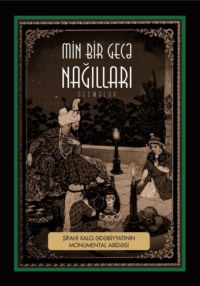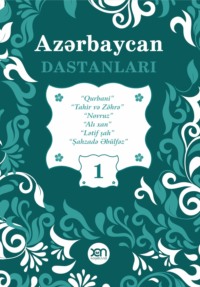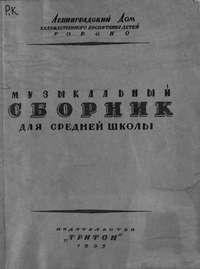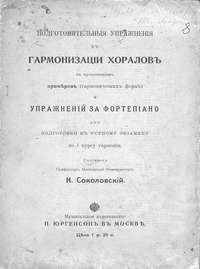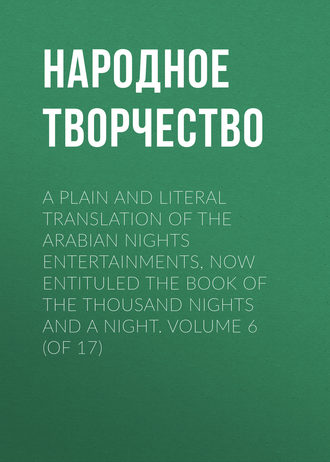 полная версия
полная версияA plain and literal translation of the Arabian nights entertainments, now entituled The Book of the Thousand Nights and a Night. Volume 6 (of 17)
She said, It hath reached me, O auspicious King that Mardas, coming into the presence of Ajib, said to him, “I come to place myself under thy protection!” Quoth Ajib, “Tell me who hath wronged thee, that I may protect thee against him, though it were Sabur, King of the Persians and Turcomans and Daylamites.” Quoth Mardas, “O King of the Age, he who hath wronged me is none other than a youth whom I reared in my bosom. I found him in his mother’s lap in a certain valley and took her to wife. She brought me a son, whom I named Sahim al-Layl, and her own son, Gharib hight, grew up on my knees and became a blasting thunderbolt and a lasting calamity,360 for he smote Al-Hamal,361 Prince of the Banu Nabhan, and slew footmen and threw horsemen. Now I have a daughter, who befitteth thee alone, and he sought her of me; so I required of him the head of the Ghul of the Mountain, wherefore he went to him and, after engaging him in singular combat, made the master his man and took the Castle of Sasa bin Shays bin Shaddad bin Ad, wherein are the treasures of the ancients and the hoards of the moderns. Moreover, I hear that, become a Moslem, he goeth about, summoning the folk to his faith. He is now gone to bear the Princess of Persia, whom he delivered from the Ghul, back to her father, King Sabur, and will not return but with the treasures of the Persians.” When Ajib heard the story of Mardas he changed colour to yellow and was in ill case and made sure of his own destruction; then he said, “O Mardas, is the youth’s mother with thee or with him?”; and Mardas replied, “She is with me in my tents.” Quoth Ajib, “What is her name?”; quoth Mardas, “Her name is Nusrah.” “‘Tis very she,” rejoined Ajib and sent for her to the presence. Now when she came before him, he looked on her and knew her and asked her, “O accursed, where are the two slaves I sent with thee?”; and she answered, “They slew each other on my account;” whereupon Ajib bared his blade and smote her and cut her in twain. Then they dragged her away and cast her out; but trouble and suspicion entered Ajib’s heart and he cried, “O Mardas, give me thy daughter to wife.” He rejoined, “She is one of thine handmaids: I give her to thee to wife, and I am thy slave.” Said Ajib, “I desire to look upon this son of an adulteress, Gharib, that I may destroy him and cause him taste all manner of torments.” Then he bade give Mardas, to his daughter’s dowry, thirty thousand dinars and an hundred pieces of silk brocaded and fringed with gold and an hundred pieces of silk-bordered stuffs and kerchiefs and golden collars. So he went forth with this mighty fine dowry and set himself to equip Mahdiyah in all diligence. Such was their case; but as regards Gharib, he fared on till he came to Al-Jazírah, which is the first town of Al-Irak362 and is a walled and fortified city and he hard by it called a halt. When the townsfolk saw his army encamped before it, they bolted the gates and manned the walls, then went to the King of the city, who was called Al-Dámigh, the Brainer, for that he used to brain the champions in the open field of fight, and told him what was come upon them. So he looked forth from the battlements of the palace and seeing a conquering host, all of them Persians; encamped before the city, said to the citizens, “O folk, what do yonder Ajams want?”; and they replied, “We know not.” Now Al-Damigh had among his officers a man called Saba’ al-Kifár, the Desert-lion, keen of wit and penetrating as he were a flame of fire; so he called him and said to him, “Go to this stranger host and find out who they be and what they want and return quickly.” Accordingly, he sped like the wind to the Persian tents, where a company of Arabs rose up and met him saying, “Who art thou and what dost thou require?” He replied, “I am a messenger and an envoy from the lord of the city to your chief.” So they took him and carried him through the lines of tents, pavilions and standards, till they came to Gharib’s Shahmiyánah and told him of the mission. He bade them bring him in and they did so, whereupon he kissed ground before Gharib and wished him honour and length of days. Quoth Gharib, “What is thine errand?” and quoth Saba’ al-Kifar, “I am an envoy from the lord of the city of Al-Jazirah, Al-Damigh, brother of King Kundamir, lord of the city of Cufa and the land of Irak.” When Gharib heard his father’s name, the tears railed from his eyes in rills and he looked at the messenger and said, “What is thy name?”; and he replied, “My name is Saba’ al-Kifar.” Said Gharib, “Return to thy lord and tell him that the commander of this host is called Gharib, son of Kundamir, King of Cufa, whom his son Ajib slew, and he is come to take blood-revenge for his sire on Ajib the perfidious hound.” So Saba’ al-Kifar returned to the city and in great joy kissed the ground, when Al-Damigh said, “What is going on there, O Saba’ al-Kifar?” He replied, “O my master, the leader of yon host is thy nephew, thy brother’s son,” and told him all. The King deemed himself in a dream and asked the messenger, “O Saba’ al-Kifar, is this thou tellest me true?” and the Desert-lion answered, “As thy head liveth, it is sooth!” Then Al-Damigh bade his chief officers take horse forthright and all rode out to the camp, whence Gharib came forth and met him and they embraced and saluted each other; after which Gharib carried him to his tents and they sat down on beds of estate. Al-Damigh rejoiced in Gharib, his brother’s son, and presently turning to him, said, “I also have yearned to take blood-revenge for thy father, but could not avail against the dog thy brother; for that his troops are many and my troops are few.” Replied Gharib, “O uncle, here am I come to avenge my sire and blot out our shame and rid the realm of Ajib.” Said Al-Damigh, “O son of my brother, thou hast two blood-wreaks to take, that of thy father and that of thy mother.” Asked Gharib, “And what aileth my mother?” and Al-Damigh answered, “Thy brother Ajib hath slain her.”–And Shahrazad perceived the dawn of day and ceased to say her permitted say.
Now when it was the Six Hundred and Thirty-sixth Night,She said, It hath reached me, O auspicious King, that when Gharib heard these words of his uncle Al-Damigh, “Verily thy brother Ajib hath slain her!”, he asked what was the cause thereof and was told of all that had happened, especially how Mardas had married his daughter to Ajib who was about to go into her. Thereupon Gharib’s reason fled from his head and he swooned away and was nigh upon death. No sooner did he come to himself than he cried out to the troops, saying, “To horse!” But Al-Damigh said to him, “O son of my brother, wait till I make ready mine affairs and mount among my men and fare with thee at thy stirrup.” Replied Gharib, “I have no patience to wait; do thou equip thy troops and join me at Cufa.” Thereupon Gharib mounted with his troops and rode, till he came to the town of Babel,363 whose folk took fright at him. Now there was in this town a King called Jamak, under whose hand were twenty thousand horsemen, and there gathered themselves together to him from the villages other fifty thousand horse, who pitched their tents facing the city. Then Gharib wrote a letter and sent it to King Jamak by a messenger, who came up to the city-gate and cried out, saying, “I am an envoy;” whereupon the Warder of the Gate went in and told Jamak, who said, “Bring him to me.” So he led in the messenger, who kissing the ground before the King, gave him the letter, and Jamak opened it and read its contents as follows: “Praise be to Allah, Lord of the Three Worlds, Lord of all things, who giveth to all creatures their daily bread and who over all things is Omnipotent! These from Gharib, son of King Kundamir, lord of Irak and Cufa, to Jamak. Immediately this letter reacheth thee, let not thy reply be other than to break thine idols and confess the unity of the All-knowing King, Creator of light and darkness, Creator of all things, the All-powerful; and except thou do as I bid thee, I will make this day the blackest of thy days. Peace be on those who follow in the way of Salvation, fearing the issues of fornication, and obey the hest of the Most High King, Lord of this world and the next, Him who saith to a thing:—Be; and it becometh!” Now when Jamak read this letter, his eyes paled and his colour failed and he cried out to the messenger, “Go to thy lord and say to him:—To-morrow, at daybreak there shall be fight and conflict and it shall appear who is the conquering hero.” So he returned and told Gharib, who bade his men make ready for battle, whilst Jamak commanded his tents to be pitched in face of Gharib’s camp; and his troops poured forth like the surging sea and passed the night with intention of slaughter. As soon as dawned the day, the two hosts mounted and drew up in battle-array and beat their drums amain and drave their steeds of swiftest strain; and they filled the whole earthly plain; and the champions to come out were fain. Now the first who sallied forth a-championing to the field was the Ghul of the Mountain, bearing on shoulder a terrible tree, and he cried out between the two hosts, saying, “I am Sa’adan the Ghul! Who is for fighting, who is for jousting? Let no sluggard come forth to me nor weakling.” And he called out to his sons, saying, “Woe to you! Bring me fuel and fire, for I am an-hungered.” So they cried upon their slaves who brought firewood and kindled a fire in the heart of the plain. Then there came out to him a man of the Kafirs, an Amalekite of the unbelieving Amalekites, bearing on his shoulder a mace like the mast of a ship, and drove at Sa’adan the Ghul, saying, “Woe to thee, O Sa’adan!” When the giant heard this, he waxed furious beyond measure and raising his tree-club, aimed at the Infidel a blow, that hummed through the air. The Amalekite met the stroke with his mace, but the tree beat down his guard and descending with its own weight, together with the weight of the mace upon his head, beat in his brain-pan, and he fell like a long-stemmed palm-tree. Thereupon Sa’adan cried to his slaves, saying, “Take this fatted calf and roast him quickly.” So they hastened to skin the Infidel and roasted him and brought him to the Ghul, who ate his flesh and crunched his bones.364 Now when the Kafirs saw how Sa’adan did with their fellow, their hair and pile stood on end; their skins quaked, their colour changed, their hearts died within them and they said to one another, “Whoso goeth out against this Ghul, he eateth him and cracketh his bones and causeth him to lack the zephyr-wind of the world.” Wherefore they held their hands, quailing for fear of the Ghul and his sons and turned to fly, making for the town; but Gharib cried out to his troops, saying, “Up and after the runaways!” So the Persians and the Arabs drave after the King of Babel and his host and caused sword to smite them, till they slew of them twenty thousand or more. Then the fugitives crowded together in the city-gate and they killed of them much people; and they could not avail to shut the gate. So the Arabs and the Persians entered with them, fighting, and Sa’adan, snatching a mace from one of the slain, wielded it in the enemy’s face and gained the city race-course. Thence he fought his way through the foe and broke into the King’s palace, where he met with Jamak and so smote him with the mace, that he toppled senseless to the ground. Then he fell upon those who were in the palace and pounded them into pieces, till all that were left cried out, “Quarter! Quarter!” and Sa’adan said to them, “Pinion your King.”–And Shahrazad saw the dawn of day and ceased saying her permitted say.
INDEX
A’amash (Al-) = one with watering eyes, 96
Abd al-Ahad = slave of the One (God), 221
Abd al-Rahím = slave of the Compassionate, 211
Abd al-Salám (Pr. N.) = slave of salvation, 211
Abd al-Samad = slave of the Eternal, 221
Abd al-Samad al-Samúdi (for Samanhúdi?), 87
Abraham the friend = mediæval “St. Abraham”, 270
Abtan (Al-) = the most profound (see Bátiní), 221
Abu Karn = Father of the Horn (unicorn?), 21
Abu Hosayn = Father of the Fortlet (fox), 211
Abyssinians (hardly to be called blackamoors), 63
Acquit me of responsibility (formula of dismissing a servant), 243
Adam’s Peak (Ar. Jabal al-Ramun), 65
Adites (first and second), 269
Adnán (land of) = Arabia, 94
Ahwáz (city and province of Khuzistan), 287
Ahl al-Bait = the person of the house (euphemistically for wife), 199
Ajíb (Pr. N.) = wonderful, 257
Akh = brother (wide signification of the word), 243
Albatross (supposed never to touch land), 33
Alcinous (of the Arabian Odyssy), 65
Allah (be praised whatso be our case), 3
–– (“the Manifest Truth”), 93
–– is omniscient, (formula used when telling an improbable tale), 210
–– (the Opener), 216
–– (it is He who gives by our means), 233
–– (sight comprehendeth Him not), 283
Almenichiaka, 124
Almond-Apricot, 277
Amalekites, 264; 265
Amid (Amidah), town in Mesopotamia, 106
Anbar (Ambar) = ambergris, 60
Andalusian = Spanish (i.e. of Vandal-land), 101
Angels (ride piebalds), 146
Antar and the Chosroë, 285
–– (contest with Khosrewan), 289
Apodosis omitted, 203; 239
Apes (isle of), 23
–– (and their lustful propensities), 54
–– (gathering fruits), 56
Arab (style compared with Persian), 125
Arar = Juniper, 95
Aristomenes and his fox, 45
Arúbah (Al-) = Friday, 190
Armenians (porters of Constantinople), 1
Asaf bin Barkhiya (Solomon’s Wazir), 99
Asháb al-Ráy (epithet of the Hanaff school), 146
Asoka’s wife and Kunála, 127
Ashjár = door-posts or wooden bolts, 191
Aurat = shame, nakedness (woman, wife), 30
–– (of man and woman), 118
Ayát al-Naját = Verses of Safety, 108
Báb al-Nasr = Gate of Victory (at Cairo), 234
Bundukániyah (quarter of Cairo), 254
Banú Abbás (their colours black), 86
–– Kahtán, 260
–– Nabhán, 262
–– Umayyah (their colours, white), 86
Banyán = Ficus Indica, 81
Barge (Ar. Bárijah), 24
Bárijah (pl. bawárij) = Jarm, barge, ib.
Batáikh (batáyikh) = water-melons, 208
Bath (suggesting freshness from coition), 135
–– and privy favourite haunts of the Jinns, 141
–– (not to be entered by men without drawers), 150
Bathsheba and Uriah, and their congeners, 129
Bátini = a gnostic, a reprobate, 221
Bawwáb = door-keeper, 189
Beckoning (Eastern fashion of, the reverse of ours), 109
Benches (in olden Europe more usual than chairs), 26
Berbers from the Upper Nile (the “Paddies” of Egypt), 189
Bilád al-Filfil = home of pepper (Malabar), 38
Birds (sing only in the pairing season), 15
–– (huge ones discovered on the African coast), 17
–– (left to watch over wives), 132
–– (pretended understanding of their language), 169
Birkat = tank, pool, etc., 57
Biunes, bisexuals and women robed with the sun, 168
Black (colour of the Abbasides), 86
Box-trick (and Lord Byron), 168
Brass (Ar. Nuhás asfar), 83
Breath (of crocodiles, serpents, etc.), 29
Brides of the Treasure, 109
Brother (has a wide signification amongst Moslems), 243
Bukjah = bundle, 226
Bulád (Pers. Pulád) = steel, 115
Burka’ = face-veil, 131; 192
Cairene vulgarism, 278
Camel (seen in a dream is an omen of death; why?), 92
Camphor (primitive way of extracting it), 21
Camphor-apricot, 277
Cannibals and cannibalism, 36
Ceruse (Ar. Isfídáj), 126
Ceylon (Ar. Sarandib), 64; 81
City of Brass, 83
Cocoa-nut (Ar. Jauz al-Hindi), 55
Colossochelys = colossal tortoise, 33
Colours (of the Caliphs), 86
–– (names of), 111
Commander of the Faithful (title introduced by Omar), 247
Comorin (derivation of the name), 57
“Consecrated ground” (unknown to Moslems), 161
Cousin (first, affronts an Arab if she marries any save him without his leave), 145
Created for a mighty matter (i.e. for worship and to prepare for futurity), 91
Crocodiles (breath of), 29
Crow (an ill-omened bird), 170
Dabbús = mace, 249
Dáhish (Al-) = the Amazed, 96
Dajjál (Al-) = Moslem Anti-Christ, 11
Darakah = target, 9
Datura Stramonium (the insane herb), 36
“Daughters of God” (the three), 282
David (hauberks of his make), 113
Death (manners of, symbolised by colours), 250
Death-prayer (usually a two-bow prayer), 70
Delight of the Intelligent, etc. (fancy title of a book), 80
Despotism (tempered by assassination), 206
Dhámí = the Trenchant (sword of Antar), 271
Diamonds (occurring in alluvial lands), 18
Dihlíz = passage, 10
Do not to others what thou wouldest not they do unto thee, 125
Door-keepers (in Egypt mostly Berbers), 189
Drinking bouts (attended in bright dresses), 175
Elliptical expression, 288
Emerald (mace-head of), 67
–– (rods in lattice-windows), 117
“Enfants Terrible” in Eastern guise, 211
Envying another’s wealth wrongs him, 77
Euphemisms, 75; 145
Evil (befalling thee is from thyself), 138
Family (euphemistically for wife), 75
Fás = city of Fez, 222
Fárikín for Mayyafárikín (city in Diyar-bakr), 107
Farz = obligatory prayer, 193
Fátihah (repeated to confirm an agreement), 217
Fátimah (Pr. N. = the weaner), 145
Fatimite (Caliphs, their colours green), 86
Fausta and Crispus, 127
Fire (there is no blower of = utter desolation), 15
–– (forbidden as punishment), 26
–– (none might warm himself at their), 261
Fish (-islands), 6
–– (the ass-headed), 33
–– (great = Hút, common = Samak), 69
Flea (still an Egyptian plague), 205
Food-tray of Sulayman, 80
Fox (Ar. Abú Hosayn, Sa’lab), 211
Fruit of two kinds, 277
Fulk = boat, 62
Fustát = Old Cairo, 87
Galactophagi (use milk always in the soured form), 201
Gems and their mines, 18
Ghazá-wood = yellow-flowered Artemisia, 192
Ghúl = ogre, cannibal, 36
“Greatness belongeth to God alone” (used elliptically), 288
Green (colour of the Fatimite Caliphs), 86
Grimm’s “Household Tales” quoted, 230
Háfiz (f. Háfizah) = 1, traditionist; 2, one who can recite the Koran by rote, 195
Halíb = fresh milk, 201
Hauráni towns (weird aspect of), 102
–– – (their survival accounted for by some protracted drought), 116
Heart-ache (for stomach-ache), 194
Herb (the insane), 36
Hippopotamus, 33
House-breaking (four modes of), 247
Hút = great fish, 69
Ichthyological marvels, 33
‘Iddah (of widowhood), 256
Imlik (great-grandson of Shem), 264
Inconsequence (characteristic of the Eastern Saga), 61
–– (of writer of The Nights), 205
Insula (for Peninsula), 57
Inverted speech, 262
Irak, etc., used always with the article, 291
Isbánír = Ctesiphon (?), 279
Isfídáj = ceruse, 126
Ishárah = signing, beckoning, 109
Izár = waist cloth, 50
Jabal al-Ramun = Adam’s Peak, 65
Jarm (Ar. Bárijah), 24
Jauz al-Hindi = cocoa-nut, 55
Javelins, 263
Jawáb-club, 262
Joseph and Potiphar’s wife, 127
Júdar (Classical Arab name), 213
–– (and his brethren, version of a Gotha MS.), 257
Júdariyah (quarter of Cairo), 254
Jum’ah = assembly (Friday), 120; 190
Jumblat (for Ján-pulád, Life o’ Steel, Pr. N.), 115
Justice (poetical in the Nights), 255
Kabáb (mutton or lamb grilled in small squares), 225
Kahramán (Persian hero), 257
Kahtan (sons of), 260
Kala (island), 47
Kalamdán = reed-box (ink-case), 167
Kánún = furnace, brazier, 5
Kaum = razzia; tribe, 266
Karawán = Charadrius œdicnemus, 1
Karkadán, etc. = rhinoceros, 21
Karkar (Carcer?), Sea of Al-, 101
Karún (lake), 217
Kashmír people (have a bad name in Eastern tales), 156
Kassar’ Allah Khayr-ak = Allah increase thy weal, 233
Kazdír = tin, 39
Kasr = palace, one’s house, 240
Kawwás = archer, Janissary, 241
Kázi of the army (the great legal authority of a country), 131
Khalíyah = bee-hive; empty, 246
Kháwí (skin of), 66
Khurj (Al-) = saddle-bag (las Alforjas), 224
Khwájah (Howajee) = schoolmaster, man of letters, etc., 46
Khwárazm = land of the Chorasmioi, 113
Killed (once more = Hibernicè kilt), 171
Kiná’ = veil, 192
Kingfisher (Lucian’s), 49
Kintar = a hundred weight (quintal), 94
Kitfír (Itfír) = Potiphar, 172
Kízan fukká’a = jars for fukká’a (a kind of beer), 88
Koran quoted (xxiv. 39), 93
–– (lii. 21), 95
–– (ix. 51; xiv. 15), 108
–– (xxxviii. 11), 115
–– (iv. 81), 138
–– (iv. 78; xli 28), 144
–– (ix. 51), 191
–– (iii. 17), 270
–– (xiii. 3), 277
–– (vi. 103), 282
Kulayb (and his domain), 261
Kuta’ah = a bit cut off, etc., 272
La’an = curse, 178
Laban = milk artificially soured, 201
Laban-halíb = fresh milk, ib.
Ladies of the family (waiting upon the guests), 237
Lake Kárún, 217
Lane quoted, 1; 8; 11; 33; 61; 66; 80; 191; 196; 214; 216; 247; 257; 282
Lasting Calamity = a furious knight, 290
Laylat al-Kadr = Night of power, 180
Leaving one standing (pour se faire valoir), 252
Líf = fibre of palm-fronds, 50
Litholatry of the old Arabs, 269
Living (the, who dieth not), 67
Mace (Ar. Dabbús), 249
Magháribah (pl. of Maghribi) = Western man, Moor, “Maurus”, 220
Maháráj = great Rajah, 8; 67
Maid and Magpie, 182
Mál = Badawi money, flocks, “fee”, 267
Mankind (creates its analogues in all the elements), 121
Mann = from two to six pounds, 80
Mares (impregnated by the wind), 9
Markúb = shoe, 207
Marmar = marble, alabaster, 95
Mastabah = bench of masonry, 26
Maund, see Mann, 80
Mihráj = Maháráj q.v., 67
Miknás = town Mequinez, 223
Miknasah = broom, 158
Milk (Ar. Laban, Halíb), 201
–– (by nomades always used in the soured form), ib.
Million (no Arabic word for, expressed by a thousand thousand), 98
“Mis”-conformation (prized by women), 156
Moses (describes his own death and burial), 116
Moslem (kind feeling shown to a namesake), 13
–– (corpses should be burnt under certain circumstances), 26
–– (commonplace of condolence), 41
–– (sales, formula of), 73
–– (consecrated ground unknown to them), 161
–– (a free-born’s sale is felony), 240
Mother (waiting upon the adult sons), 237
Mrigatrishná = the thirst of the deer (mirage), 93
Mufti (Doctor of Law), 254
Muhammad, Ahmad and Mahmúd, 273
Muráhanah = game of forfeits, 204
Murders (to save one’s life approved of), 44
Músá bin Nusayr (conqueror of Spain), 86
Musáfahat = joining palms for shaking hands, 287
Na’al = sandal, shoe, horse-shoe, 207
Nabhán (sons of), 262
Nábigah al-Zubyáni (pre-Islamitic poet), 85
Nahr = river, 163
Najásah = nastiness (anything unclean), 178
Nakedness (Ar. Aurat), 30
Nákús = wooden gong (used as bell), 47
Neighbours (frequently on the worst of terms), 236
“New Arabian Nights”, 257
Nuhás (vulg. Nihás, Nahás) asfar = brass, 83
Nusf = half-dirham, 214
Opener (of the door of daily bread), 216
Ophidia (of monstrous size), 29
Palace (of the Caliphs of Baghdad), 189
Palaces (avoided by the pious), 182
Partridges (story of the two), 183
Pausing as long as Allah pleased = musing a long time, 109
Pearl-fisheries, 60
Pepper (and the discovery of the Cape route), 38
–– (-plantations shaded by bananas), 57
Phædra and Hippolytus, 127
Philosophic (used in a bad sense), 257
Pidar sokhtah = (son of a) burnt father (Persian insult), 26
Pilgrimage quoted (i. 297), 57
–– (i. 180), 61
–– (i. 349; iii. 73), 263
–– (ii. 116; iii. 190), 264
–– (i. 370), 276
–– (i. 298), 277
–– (ii. 332), 287
Poetical justice (administered with vigour in The Nights), 25
Poison (deadly only in contact with abraded skin), 202
Polyphemus (in Arab garb), 24
–– (no Mistress P. accepted), 27


